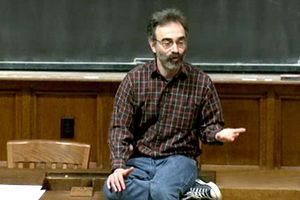User:Siddhartha-Wolf/MoS
The following is just one account of many similar lectures that have taken place over the past ten years, despite all the hard work put into our otherwise exemplary education system.

Good afternoon students, welcome back to Philosophy PH-1902, I hope you're all well-rested and refreshed - this semester will be some slog! Six weeks of hard study and then exams, it will be tough, but I'm sure some of you will pull through and for the rest of you, well, you can always resit next year (except you, Walker, remember, you can't resit forever - or can you?).
So, the topic of the day is The Myth of Sisyphus. Now, I had difficulty deciding exactly where to place this, after all, it is a philosophical concept first put forward in an essay of the same name by Albert Camus in 1942, but it is also based upon a timeless tale from Greek Mythology. However, since Greek philosophy generally concerns itself with ethics, crude metaphysics and justifying sodomy [audible student guffawing], it makes more sense that this existentially-themed subject be treated here as part of this Existentialism course.
Just in case you had forgotten where we had got to, we started off with Nietzsche, then examined the novels of Dostoevsky and Kafka, some Heidegger, Sartre...
Don't you remember? Why oh why, do i always have to go over everything again and again?
Background[1][edit | edit source]
Ok then class, I guess I can do a short refresher so you know where this fits in.
Ok, so you may recall Nietzsche informing us that - after having a long drawn-out discussion with God regarding his role in human affairs - God was now dead[2] and we should stop looking to him for support in the running of our lives. Of course, this left something of a gap - some might say an infinitely large gap - that he believed we poor orphans should fill with something more exciting, wholesome and meaningful. Most importantly, he said, this gap should be filled with something altogether more realistic[3], but since his ideas suffered endless PR issues due to their influence on early 20th Century political theory, the void remained to be filled by, well, just about anyone.
So for more or less the next century, academics applied themselves to working on what exactly could fill this void. Some turned to the workings of the mind, others to the foundations of logic and language itself, while some others turned to the devil for help. Another group decided they had no worthwhile responses and they'd rather devote their lives to pointing out how utterly pointless everything is.
Our man, Albert Camus, belongs to this final group.
The Myth of Sisyphus[edit | edit source]
Coming soon to a blank section of uncyclopedia near you. This blank section in fact.
- ↑ Note: The embedded links correspond to the accompanying slides shown while the following notes correspond to the professor's own notes, to be distributed after the lecture:
- ↑ Perhaps he'd stuck Wagner on mid-interview, it's hard to say
- ↑ Ironically Hollywood showed interest in incorporating Nietzchean theory into their movies, but completely misunderstood what he meant by the 'Superman'
This page is a work in progress |

